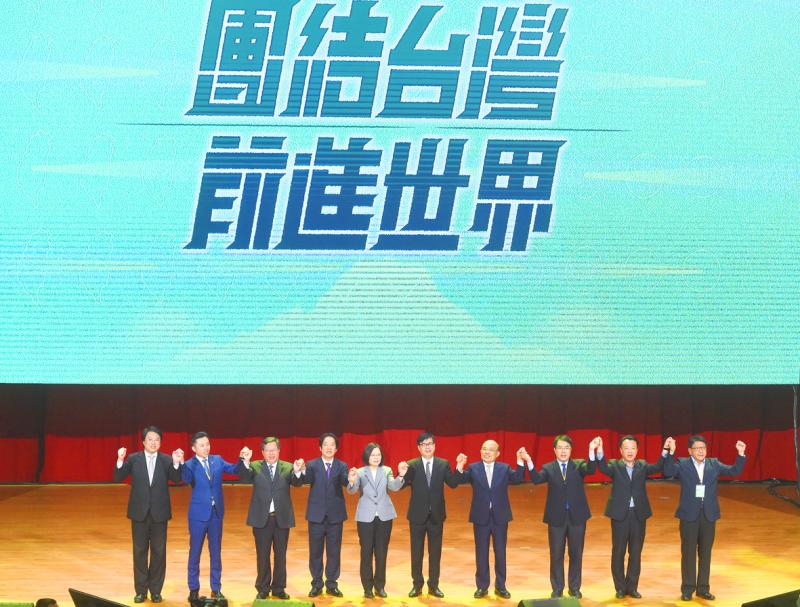Constitutional reform is one of the most important advancements for Taiwan, President Tsai Ing-wen (蔡英文) said yesterday, adding that items that should be prioritized include lowering the voting age from 20 to 18, and abolishing the Examination Yuan and the Control Yuan, as the issues have cross-party consensus.
Tsai made the remarks in a speech at the Democratic Progressive Party’s (DPP) national congress in Taipei, which she presided over in her capacity as party chairperson.
Tsai highlighted major missions for the party.

Photo: Chien Jung-fong, Taipei Times
First, the DPP should quickly propose guidelines on constitutional amendments related to lowering the voting age — along with other civil rights provided to citizens over 20 — as well as abolishing the Examination Yuan and the Control Yuan, so that party caucuses can discuss the issues at the legislature’s Constitutional Amendment Committee, Tsai said.
Tsai also called on opposition parties, saying that all parties should cherish the “constitutional moment.”
Second, the DPP should dedicate more resources to cultivating young talent for the nation, she said.
Third, the party should continue to deepen democracy in Taiwan and defend its democratic values amid global uncertainties, Tsai said, citing the situation in Hong Kong, where freedom and human rights have become seriously undermined after China imposed national security legislation on the territory.
As a party that survived totalitarian oppression, the DPP would share Taiwan’s experience in establishing democratic institutions with the international community, and support Hong Kongers fighting for democracy, Tsai said.
Fourth, the DPP should “recover its glory in Kaohsiung” by winning the city’s mayoral by-election, which is set for Aug. 15, she said.
Tsai also said that Taiwan’s economic recovery amid the COVID-19 pandemic has had a good start, as crowds were seen in various locations nationwide on the first weekend following the release of the government’s Triple Stimulus Vouchers, which she said was a sign of increased business opportunities.
However, the DPP cannot be complacent about its policy results, otherwise public support could slip away, Tsai said, telling party members that “integrity, diligence and love for the country” remain the party’s chief commitments.
Chinese Nationalist Party (KMT) spokeswoman Hung Yu-chien (洪于茜) said that constitutional reform should be carried out with cross-party consensus, but the Tsai administration does nothing but “exercise crushing tyranny of the majority.”
The attitude shows no respect for opposition parties and creates “extremely unequal power between the ruling and opposition parties” at the legislature, Hung added.
The KMT believes the DPP is bringing up abolishing the Examination Yuan and the Control Yuan to shift focus away from its incompetence at governing the nation and its tyrannical leadership, she said.
The KMT would establish a constitutional amendment committee comprising party members and academics to discuss issues, including the Examination Yuan and the Control Yuan, she said.
The KMT would not finalize its stance on the matter before that, she added.
New Power Party caucus whip Chiu Hsien-chih (邱顯智) said his party would support constitutional reform, as it would address issues that have long been unresolved.
Taiwan People’s Party Legislator Jang Chyi-lu (張其祿) agreed, saying that abolishing the two branches of government and lowering the voting age to 18 are also the party’s long-time appeals.
Additional reporting by Lin Liang-sheng and Hsieh Chun-lin

MAKING WAVES: China’s maritime militia could become a nontraditional threat in war, clogging up shipping lanes to prevent US or Japanese intervention, a report said About 1,900 Chinese ships flying flags of convenience and fishing vessels that participated in China’s military exercises around Taiwan last month and in January have been listed for monitoring, Coast Guard Administration (CGA) Deputy Director-General Hsieh Ching-chin (謝慶欽) said yesterday. Following amendments to the Commercial Port Act (商港法) and the Law of Ships (船舶法) last month, the CGA can designate possible berthing areas or deny ports of call for vessels suspected of loitering around areas where undersea cables can be accessed, Oceans Affairs Council Minister Kuan Bi-ling (管碧玲) said. The list of suspected ships, originally 300, had risen to about 1,900 as

Japan’s strategic alliance with the US would collapse if Tokyo were to turn away from a conflict in Taiwan, Japanese Prime Minister Sanae Takaichi said yesterday, but distanced herself from previous comments that suggested a possible military response in such an event. Takaichi expressed her latest views on a nationally broadcast TV program late on Monday, where an opposition party leader criticized her for igniting tensions with China with the earlier remarks. Ties between Japan and China have sunk to the worst level in years after Takaichi said in November that a hypothetical Chinese attack on Taiwan could bring about a Japanese

The WHO ignored early COVID-19 warnings from Taiwan, US Deputy Secretary of Health and Human Services Jim O’Neill said on Friday, as part of justification for Washington withdrawing from the global health body. US Secretary of State Marco Rubio on Thursday said that the US was pulling out of the UN agency, as it failed to fulfill its responsibilities during the COVID-19 pandemic. The WHO “ignored early COVID warnings from Taiwan in 2019 by pretending Taiwan did not exist, O’Neill wrote on X on Friday, Taiwan time. “It ignored rigorous science and promoted lockdowns.” The US will “continue international coordination on infectious

DEEP-STRIKE CAPABILITY: The scenario simulated a PLA drill that turned into an assault on Taiwan’s critical infrastructure, with the launchers providing fire support Taiwan yesterday conducted this year’s first military exercises at Longsiang Base in Taichung, demonstrating the newly acquired High Mobility Artillery Rocket System’s (HIMARS) ability to provide fire support and deep-strike capabilities. The scenario simulated an attack on Penghu County, with HIMARS trucks immediately rolling into designated launch areas and firing barrages at the Wangan (望安) and Cimei (七美) islands, simulating the provision of fire support against invading forces. The HIMARS are supposed to “fire and leave,” which would significantly increase personnel and equipment survivability, a military official said. The drill simulated an exercise launched by the Chinese People’s Liberation Army (PLA) Eastern